
According to a Journal of Nutrition 2011 review, many Americans may fall short of meeting dietary magnesium requirements. As MedlinePlus notes, magnesium is an essential nutrient needed for more than 300 biochemical reactions in the body, so knowing how to meet your daily needs is a must.
Why Magnesium Is Important
Magnesium is an essential mineral responsible for a variety of functions within your body. It supports a healthy immune system and strong bones, helps with energy production and blood glucose regulation, keeps your heartbeat steady, and helps maintain normal muscle and nerve functions.
A deficiency in magnesium can lead to:
- Numbness
- Muscle spasms
- Muscle cramps
- Muscle twitching
- Weakness
- Convulsions
- Abnormal eye movements
- Fatigue
- Confusion
- Poor memory
- Problems learning
- Difficulty sleeping
Groups at risk for magnesium deficiency include:
- Elderly people
- Chronic alcoholics
- People with renal disorders
- Individuals with type 2 diabetes
- Extensive burn victims
- People with gastrointestinal disorders
- Individuals with low blood calcium levels
The Amount of Magnesium You Need
You can easily get all the magnesium you need by eating a well-balanced, magnesium-rich diet. Magnesium recommended dietary allowances (RDAs) are as follows.
| Life Stage | Age | Males (mg/day) | Females (mg/day) |
|
Children |
1-3 years |
80 |
80 |
|
Children |
4-8 years |
130 |
130 |
|
Children |
9-13 years |
240 |
240 |
|
Adolescents |
14-18 years |
410 |
360 |
|
Adults |
19-30 years |
400 |
310 |
|
Adults |
31 years and older |
420 |
320 |
|
Pregnancy |
18 years and younger |
- |
400 |
|
Pregnancy |
19-30 years |
- |
350 |
|
Pregnancy |
31 years and older |
- |
360 |
|
Breast-feeding |
18 years and younger |
- |
360 |
|
Breast-feeding |
19-30 years |
- |
310 |
|
Breast-feeding |
31 years and older |
- |
320 |
*Chart adapted from the Linus Pauling Institute.
Magnesium-Rich Foods
Milk, yogurt and chicken are good sources of magnesium. Other foods rich in magnesium include:
- Fruits: bananas, dried apricots, raisins, and avocados
- Vegetables: spinach, Swiss chard, other leafy greens, potatoes, broccoli, and okra
- Legumes: peas, chick peas, black beans, kidney beans, other dried beans, and lentils
- Nuts: cashews, almonds, peanuts, Brazil nuts, hazelnuts, pine nuts, peanut butter, and cashew butter
- Seeds: pumpkin seeds, sesame seeds, flaxseeds, and sunflower seeds
- Soy products: tofu, tempeh, soy milk, soybeans, soy nuts, soy yogurt, and soy cheese
- Whole grains: magnesium-fortified breakfast cereals, shredded wheat, whole-wheat bread, wheat-germ cereal, oat bran cereal, all bran cereal, oatmeal, brown rice, millet, and quinoa
- Fish: salmon, halibut, mackerel, Pollock, and crab
Sample Magnesium-Rich Menu
The following menu is based on a 2,000-calorie plan.
Breakfast
- One packet of plain instant oatmeal: 36 mg
- ½ cup of raisins: 23 mg
- 1 ounce of almonds: 80 mg
- 2 scrambled eggs
- 1 cup of black coffee
Snack
- 1 cup of plain soymilk: 61 mg
- 1 medium banana: 32 mg
Lunch
- 3 ounces of grilled chicken breast: 22 mg
- 2 cups of spinach salad: 78 mg
- 1 tablespoon of Italian salad dressing
- 1 cup of cooked quinoa: 94 mg
Snack
- 1 ounce of cashews: 74 mg
- 1 cup of plain yogurt: 42 mg
Dinner
- 3 ounces of baked salmon: 26 mg
- 1 cup of brown rice: 84 mg
- 1 cup of steamed broccoli: 24 mg
Snack
- 1 cup of magnesium-fortified breakfast cereal: 40 mg
- 1 cup of low-fat milk: 25 mg
Total Dietary Magnesium: 741 mg
**Sources: Office of Dietary Supplements and Dietitians of Canada
What About Supplements?
MedlinePlus notes that taking magnesium supplements generally isn't needed and getting too much magnesium from supplements can lead to toxicity. Symptoms of magnesium toxicity from supplements include:
- Nausea
- Vomiting
- Low blood pressure
- Facial flushing
- Depression
- Fatigue
- Muscle weakness
- Difficulty breathing
- Irregular heartbeat
- Heart attacks
It's always best to check with your doctor before taking supplements. If you're deficient in magnesium, your body isn't absorbing it properly, or you're at risk for deficiency, your doctor may recommend a supplement.
How Much Is Too Much?
Fortunately, you're not at risk for magnesium toxicity by eating magnesium-rich foods, as noted the Office of Dietary Supplements. However, the maximum safe amount (tolerable upper intake level) from supplements for adults is 350 milligrams daily.
Bottom Line
Chances are good you're getting all the magnesium your body needs if you're eating a well-balanced nutritious diet. You might even be getting more than enough. While magnesium is an essential nutrient, you likely don't need a magnesium supplement unless your doctor recommends it. Getting too much magnesium from supplements can cause toxicity.







